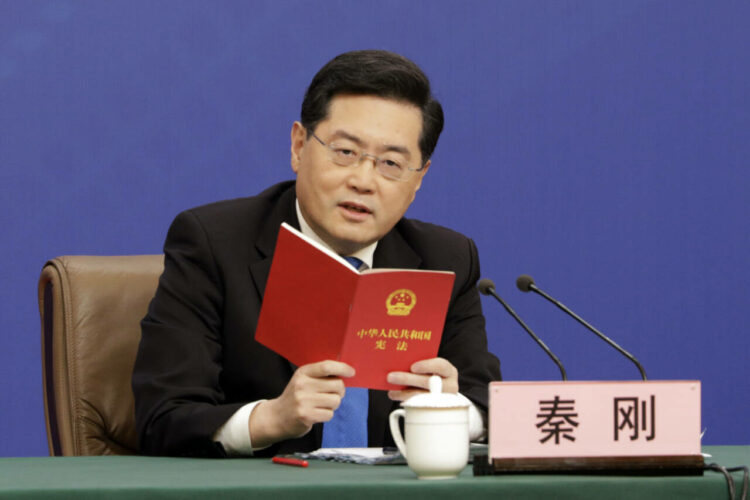The Peoples’ Republic of China (PRC) and its top legislature convened a special meeting the previous week to remove the former Foreign Minister Qin Gang’s photos from the Foreign Ministry. While some information reappeared days later, Qin does not feature on the website list of former ministers, and this phenomenon has gone to such an extent that his name does not appear in the search category: “Sorry, Qin Gang is not found.”
In fact, he has disappeared from the public for more than a month.
The foreign ministry’s brief explanation weeks ago was that his disappearance is due to a number of health reasons, a remark later excised from the official transcripts have failed to stem a swirl of speculation not just about his fate but on how the whole saga reflects on the man that supported his rapid rise which is none other than the President of China, Xi Jinping.
The Chinese government eventually replaced Qin Gang with Wang Yi.
Speculation Swirls
Chinese Foreign Ministry and the State Council Information Office, which handles the media queries on behalf of the government and party, did not immediately respond to a comment on this story. Qin’s unusually long and unexplained absence, along with the abrupt end of his tenure as well as the other strange happenings like the ministry website, means that speculation will continue to swirl.
“The truth will eventually come out-it, usually does in China, although it takes some time (months or years), but the way he was dismissed indicates that the reason behind his disappearance is not attributed to health reasons,” said Ian Johnson, the senior fellow for China Studies at the Council of the Foreign Relations.
Similar Incidents and Cases
Beijing-based political analyst Wu Qiang said he could almost certainly rule out health as the real reason. If that were the case, the state would have assigned a deputy to fill in for him rather than actually removing him.
Qin’s tenure barely lasted half a year in the role of becoming one of the country’s youngest foreign ministers in December 2022, a position with a five-year tenure.
Industry Minister Xiao Yaqing vanished for nearly a month last year before it was revealed that he was called for corruption. The foreign minister removed all the online traces of its former chief protocol officer Zhang Kunsheng who was found guilty of corruption, and he used his power to obtain sex in 2016.
Such erasures go back decades in China. A state-commissioned painting depicting the historical moment when Mao Zedong, the founder of Communist China, stood on the top of Tiananmen Square to announce the founding of the Peoples Republic was altered three times between 1995 and 1972 to erase officials that subsequently fell foul of Mao.
One Man Politics
The National People’s Congress Standing Committee that was convened on August 1, 2023, did not remove Qin’s other title of State Councillor, a cabinet member who ranks higher than a minister despite having the power to do so, experts say.
Despite the omission from the Foreign Ministry and its website, a portrait of a former US envoy remained hanging on the wall of the Chinese Embassy in Washington on July 27, 2023, according to a Reuters witness. Analysts also point out that Qin would have gone through a rigorous vetting process to take the role just months ago.
The Communist Party Regulations say that leaders are vetted based on their ideologies, work performance and adhere to party discipline, while they also have to declare details about their family, including whether they have lived overseas and what assets they possess.
After coming to power and the throne of China, Xi Jinping has put in place a slew of regulations to combat corruption and enforce party discipline in a bid to address corruption in ways that analysts say have consolidated members’ loyalty towards him.
Qin’s Career
Qin came to Xi’s Attention when he was made the protocol officer during Xi’s first term, a job that would give him direct access to Xi whenever the latter met the foreign leaders. He then tripled jumped from director of protocol to the American Ambassador and then to the foreign minister and state councillor in five years; the bullet train speed by Chinese standards.
The final leadership lineup of Xi’s precedent-breaking third term in office revealed earlier this year consisted mostly of officials he worked with before and trusts analysts say. He ditched a traditional process of allowing current and retired top leaders to vote on potential candidates before finalising a list for a wider group of party delegates to formally endorse
Instead, the names were decided under Xi’s direct leadership after he met with potential candidates and others personally, according to Chinese state media Xinhua. This Qin saga exposes the volatile and vulnerability of Xi’s one-man politics, said Alfred Wu, the associate professor at the Lew Kwan Yew School of Public Policy in Singapore.




















Comments